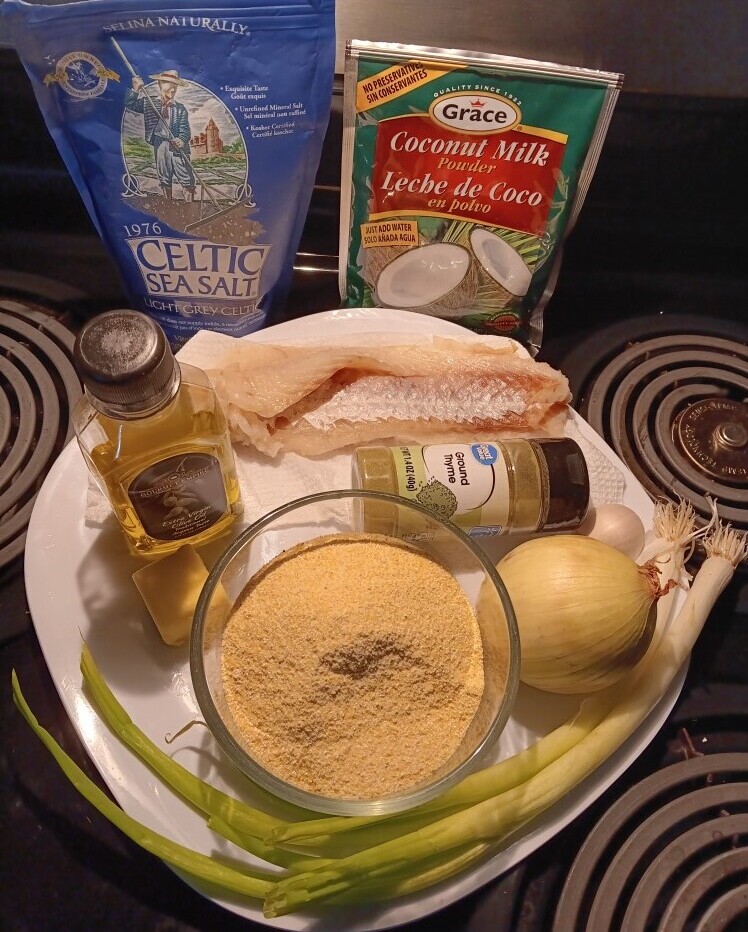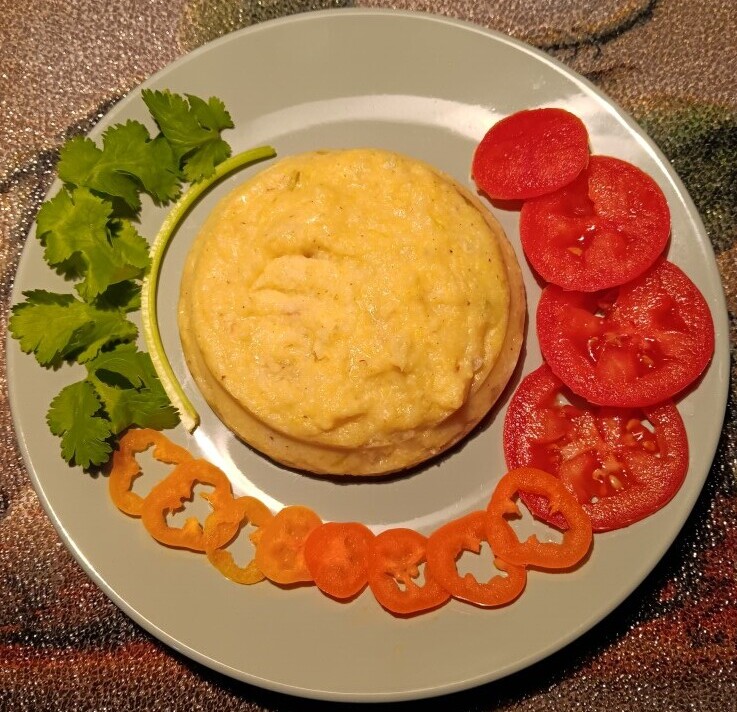In this edition of Culinary at Home with Hector, I’m thrilled to share a dish that resonates deeply with my Jamaican roots—Tun Cornmeal with Saltfish.
“Tun cornmeal” (Jamaican-style cooked cornmeal) is a cherished dish in Jamaican households. Its rich flavors and comforting aromas evokes memories of home and family gatherings. There’s something truly special about revisiting the flavors of your childhood.
This hearty, flavorful meal holds a treasured place in my family’s history. It serves as both a Friday evening staple and a humble yet delicious connection to our heritage.

A Dish for Both Family and Furry Friends
Tun cornmeal was an occasional meal for the family. Additionally, it was a practical, nourishing dish prepared for our dogs. Of course, their version didn’t always include saltfish or coconut milk. However, the consistency and simplicity of the meal made it a perfect choice.
I can’t help but admire the resourcefulness that went into feeding every member of the household, whether two-legged or four-legged.
Some Friday evenings, this dish would grace our family table, its comforting aroma filled the kitchen. Other times, I’d watch my father or brothers stir the bubbling pot of cornmeal to prepare meals for our dogs.
It highlights how nothing went to waste, as even bones, other inedible parts of the fish, and food scraps were added to the dogs’ meals. Furthermore, it shows the creativity and ingenuity of Jamaican households.
Cultural Significance of Tun Cornmeal
Tun cornmeal is a quintessential Jamaican dish that showcases the island’s knack for turning simple ingredients into something extraordinary.
Affordable and versatile, it’s a staple in many homes, offering a hearty and satisfying meal for the family.
This dish has long been a symbol of resilience. It was born out of the need to create filling meals with limited resources. Today, it remains a cherished reminder of the creativity that defines Jamaican cuisine—a blend of practicality, flavor, and tradition.
While it shares similarities with polenta, a dish popular in Italian cuisine, there are distinct differences that set them apart.
Both are made using cornmeal as a base, but the Jamaican version is typically cooked with coconut milk. This gives it a creamy, slightly sweet flavor.
Furthermore, it’s often infused with aromatic seasonings like thyme, garlic, and sometimes scotch bonnet pepper for a touch of heat.
Polenta is often served plain or paired with sauces. In contrast, tun cornmeal is a standalone dish that can be elevated with the addition of saltfish or other ingredients.
The cultural context also differs somewhat —tun cornmeal reflects Jamaica’s resourcefulness and heritage. On the other hand, polenta carries a similar role in Italian peasant traditions.
Ultimately, they showcase how simple ingredients can be transformed into a flavorful, nourishing meal.
A Taste of the Past
For me, it is a bridge to my childhood. I still remember the plop, plopping sound of the cornmeal as it thickened. This was a comforting rhythm filling the kitchen and signaling that dinner was almost ready.
It’s a sound tied to so many memories of family meals, laughter, and the irresistible aroma of thyme and coconut milk mingling with the saltfish.
My dad would always savor his plate. At times, he would comment on how perfectly it was seasoned or how it reminded him of his own childhood.
These memories feel like treasures, stored away until now. It’s been years since I’ve had this dish, but recently, I felt a deep urge to make it again.
More importantly, it’s a way of reconnecting with my roots and preserving the legacy of those who came before me.
Step-by-Step Recipe for Tun Cornmeal with Saltfish
Ingredients:
- 1 cup cornmeal (fine or coarse)
- 2 cups coconut milk (fresh or canned)
- 1 cup water (more or less as needed)
- 2 stalks scallion, chopped
- 1 small onion, finely chopped (optional)
- 1 clove garlic, minced
- 1 or 2 sprigs thyme
- 1 scotch bonnet pepper (optional, for heat)
- ½ cup saltfish, soaked and flake
- 1-2 tbsp cooking oil
- 1 tsp butter or margarine
- Salt and pepper to taste
Instructions:
1. Prepare the Saltfish: Rinse and soak the saltfish in water overnight or boil it until tender to remove excess salt. Flake it into small pieces.
2. Sauté the Seasonings and Saltfish: In a pot, sauté onion, scallion, garlic, thyme, and scotch bonnet pepper until fragrant. Add the flaked saltfish and stir.
3. Mix the Cornmeal: In a bowl, combine the cornmeal with water to form a smooth, lump-free mixture.
4. Cook the Cornmeal: Add coconut milk to the pot with the seasonings and saltfish, then slowly stir in the cornmeal mixture. Cook over low heat, stirring constantly to prevent lumps.
5. Simmer: Cook until the mixture thickens to your desired consistency. About 20–30 minutes to ensure the cornmeal is cooked properly. Adjust seasoning with salt and pepper. Add butter or margarine for a creamy finish.
6. Serve: Enjoy warm as a meal on its own or with a side of vegetables.
This method combines everything beautifully, allowing the flavors of the saltfish and vegetables to infuse the cornmeal for a rich, satisfying dish.
Rediscovering a Heritage Dish
Making this dish after so many years felt like reconnecting with an old friend. The act of cooking it brought back a flood of memories—of family dinners, my dad’s contented smile, and the simple joy of sharing a meal together.
This recipe represents so much more than sustenance. It’s a reflection of my Jamaican heritage and a testament to the love and care that went into every meal in our household.
As I stirred the pot, I felt a renewed sense of gratitude for my family and the values they instilled in me. This is a versatile dish that can be adapted in many ways beyond the traditional pairing with saltfish.
Some variations include cooking it with vegetables like okra, callaloo, or spinach, which add a fresh, nutritious twist to the dish.
For a heartier option, it can be made with coconut milk and served alongside stewed chicken or curried goat.
A vegetarian version might include flavorful seasonings like thyme, scallion, and garlic, enhanced with a hint of scotch bonnet pepper for spice.
In simpler forms, it can be served plain as a breakfast porridge, sweetened with a touch of sugar or honey and flavored with nutmeg, cinnamon, and vanilla.
These variations highlight the dish’s adaptability to suit different tastes and dietary preferences while still celebrating its Jamaican roots.

Did You Know? | Saltfish in Jamaican Cuisine
Saltfish, commonly known as dried codfish, is a staple in Jamaican cuisine and holds a special place in the island’s culinary traditions. The fish is heavily salted and dried to preserve it, a method introduced during colonial times that became integral to Caribbean cooking.
In Jamaican culture, saltfish is celebrated for its versatility and is often paired with dishes like ackee (the national dish), dumplings, yam, green bananas, callaloo, and of course, tun cornmeal.
Its unique, salty flavor adds depth to meals, making it a beloved ingredient in many homes. Before cooking, it is typically soaked or boiled to remove excess salt, then flaked and combined with seasonings to create mouthwatering dishes.
A Legacy in Every Bite
“Culinary At Home With Hector | Tun Cornmeal With Saltfish” represents a story of resilience, love, and cultural pride. I hope this dish inspires you to explore the flavors of Jamaican cuisine and reflect on the traditions that make your own family unique.
Thank you for joining me on this journey down memory lane. I look forward to sharing more of my family’s culinary heritage and Jamaican traditions in future editions of Culinary at Home with Hector.
Let’s Keep the Conversation Going!
- Have you ever tried Jamaican tun cornmeal with saltfish? If not, does this recipe inspire you to give it a try?
- What meals from your childhood bring back special memories or connect you to your heritage?
- Do you have a favorite way to prepare cornmeal dishes, or have you ever made polenta? How do you think it compares to this Jamaican recipe?
- What tips or tricks do you use when recreating traditional family recipes?
I’d love to hear your answers, experiences, or any questions you may have. Share them in the comments section below! Let’s start a conversation about the food and traditions that mean the most to us.
Veron Lee Campbell | Entrepreneur | The Way 4WordEnterprises